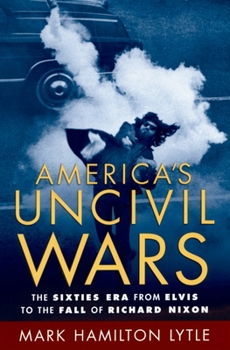America's Uncivil Wars: The Sixties Era from Elvis to the Fall of Richard Nixon
Select Format
Select Condition 
Book Overview
In contrast with most histories of this period, America's Uncivil Wars: The Sixties Era from Elvis to the Fall of Richard Nixon does not treat the 1960s as a single historical moment or as successive waves of activism. Rather, it employs a chronological narrative to identify three distinct phases during which events of the era unfolded. The first began with the cultural ferment of the 1950s and ended with the assassination of John F. Kennedy. During the second phase, from 1964-1968, the "uncivil" wars began in earnest: Americans disagreed about new social and cultural mores, protests against the Vietnam War increased in size and vehemence, and American cities erupted in racial violence. From 1967 through 1968, all of these forces combined to divide Americans more deeply than they had been since the Civil War. In the third phase, Richard Nixon promised to bring Americans together. However, a host of new value and identity movements--environmentalists, consumer advocates, feminists, gay, Latino, and Native American activists--frustrated his design. Only after the Watergate scandals forced this polarizing figure from office did a measure of civility return to the nation's public discourse.
America's Uncivil Wars captures the broad sweep of this tumultuous era, analyzing both the cultural and political influences on the movements of the 1960s. Paying particular attention to Latinos, Native Americans, feminism, and gay liberation, it integrates the politics of gender and race into the central political narrative. The book also covers such topics as McCarthyism; the FBI; rock and roll; teen culture in the 1950s; the origins of SDS, SNCC, and YAF; and the environmental and consumer movements. With its engaging narrative style and broad cultural emphasis, America's Uncivil Wars brings a fresh approach to our understanding of not only the 1960s but also U.S. history since 1945.
America's Uncivil Wars captures the broad sweep of this tumultuous era, analyzing both the cultural and political influences on the movements of the 1960s. Paying particular attention to Latinos, Native Americans, feminism, and gay liberation, it integrates the politics of gender and race into the central political narrative. The book also covers such topics as McCarthyism; the FBI; rock and roll; teen culture in the 1950s; the origins of SDS, SNCC, and YAF; and the environmental and consumer movements. With its engaging narrative style and broad cultural emphasis, America's Uncivil Wars brings a fresh approach to our understanding of not only the 1960s but also U.S. history since 1945.
Format:Paperback
Language:English
ISBN:0195174976
ISBN13:9780195174977
Release Date:February 2006
Publisher:Oxford University Press
Length:432 Pages
Weight:1.45 lbs.
Dimensions:1.0" x 6.8" x 8.7"
Customer Reviews
1 rating
Most Balanced Account of the 60s Yet
Published by Thriftbooks.com User , 18 years ago
This is the most balanced account of the 60s I've ever read. Too many authors are caught up in their own experience or continue to fight the battles of the era. America's Uncivil Wars recognizes that the 60s were more a generational experience than a discrete period of time. I fully agree with the division into three periods from 56-64, 64-68, and 68 through Watergate. A driving sense of narrative moves the book from event to event and brings to life the wide range of personalities who gave the 60s their flavor. The background material on the 50s and the growing attacks on consensus culture are rich and engagingly told. And no other book I've read gives such prominence to feminists, the Red and Brown Power movements, environmentalism, and Gay Rights. Conservative student and political movements get their due as well. My only regret is that the book, like the 60s, had to end because this is a good read.





